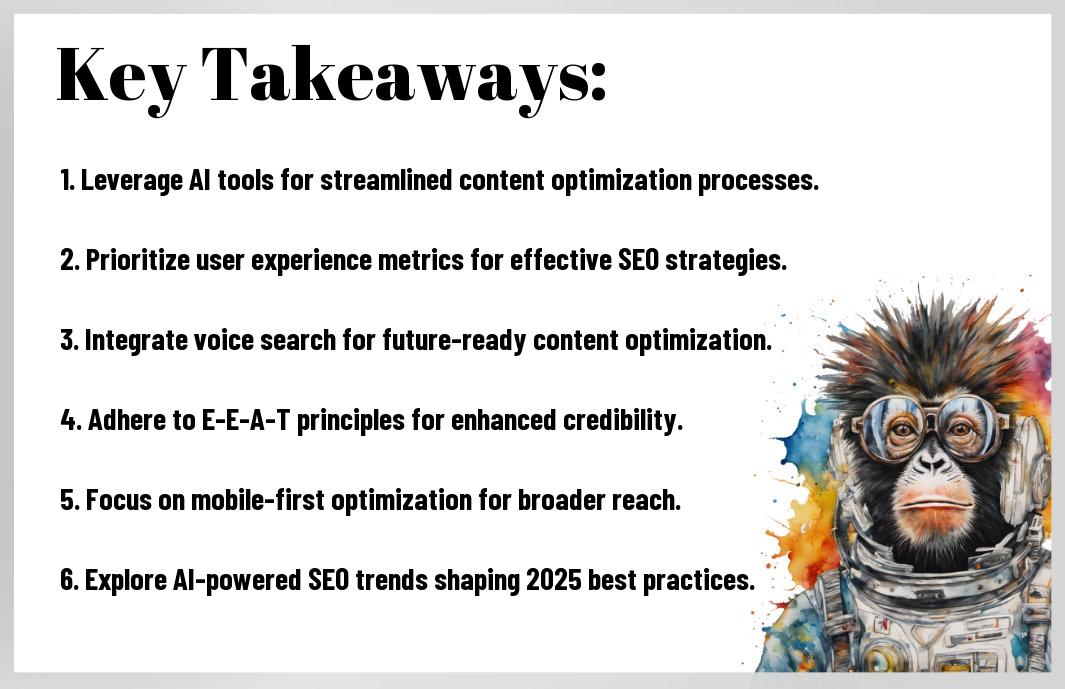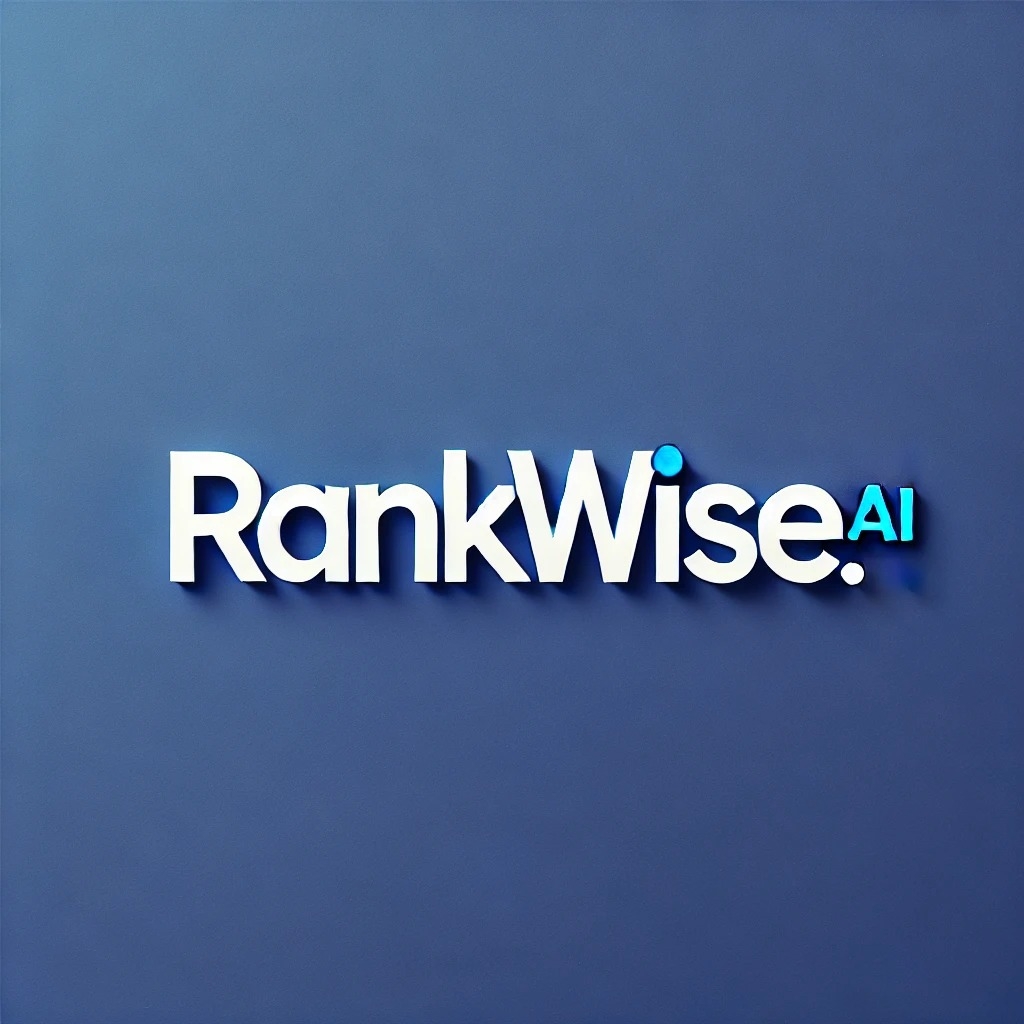
AI is transforming content optimization, making it vital for you to understand the best practices for AI-powered SEO in 2025. As you navigate this evolving landscape, embracing AI content optimization tools and strategies will enhance your ability to connect with your audience. This guide will provide you with actionable insights on content optimization best practices, including voice search optimization, user experience metrics, and adherence to E-E-A-T principles. Equip yourself with the latest trends and tools to ensure your content remains relevant and impactful in the future of digital marketing.
Key Takeaways:
- AI content optimization is transforming the way businesses approach their digital strategies, leading to the creation of more relevant and engaging content.
- As we move towards AI SEO 2025, incorporating E-E-A-T principles (Expertise, Authoritativeness, Trustworthiness) will be vital for improving search rankings and user trust.
- Adopting content optimization tools that leverage AI technology will facilitate efficient analysis and enhancement of content strategies, allowing businesses to stay competitive.
- To enhance visibility, integrating voice search optimization techniques and focusing on mobile-first optimization will be necessary as user behaviors continue to shift.
- Understanding search intent categories—from informational to transactional—will inform content development and help align strategies with user expectations.
Understanding Content Optimization
While many marketers utilize various techniques, the fundamental essence of content optimization involves refining your content to boost its visibility and effectiveness in search engines. This process not only involves the use of relevant keywords but also focuses on enhancing user experience by providing valuable, engaging, and informative content. A thorough understanding of Content Optimization with AI: 10 Effective Approaches (2025) can help you stay ahead in the digital landscape.
Definition and Importance of Content Optimization
Beside improving search rankings, content optimization is about aligning your content with user intent and behavior. It is an ongoing strategy that involves updating and refining your textual and visual elements to maximize engagement metrics like click-through rates and time on page. As search engines evolve, the tactics you employ must also adapt to maintain relevance, ensuring that your audiences find what they’re looking for in an increasingly crowded digital marketplace.
Furthermore, content optimization facilitates a deeper connection with your audience by fostering trust and authority around your brand. By focusing on creating high-quality content that adheres to the E-E-A-T principles (Expertise, Authoritativeness, and Trustworthiness), you enhance not only your SEO performance but also the overall perception of your brand in the eyes of potential customers.
The Role of AI in Modern Content Strategies
An integration of AI-powered tools enhances your ability to develop content that resonates with your audience. With initiatives such as AI content optimization, you can analyze user behavior, predict trends, and tailor your content strategy to match emerging technologies and search patterns. This evolution towards AI-powered SEO empowers marketers to deliver highly relevant content efficiently—shaping your approach to meet the demands of 2025 and beyond.
Due to the rapid advancements in AI, you now have access to an array of content optimization tools that assist in refining your strategies. These tools aid in voice search optimization and mobile-first design, ensuring that your content is easily discoverable and engaging across various platforms. By leveraging these technologies, you position yourself at the forefront of the changing digital landscape, effectively addressing user needs and preferences in real-time.


Key AI Technologies Shaping Content Optimization
Now is the time to understand how AI technologies are revolutionizing content optimization. As we move towards AI SEO 2025, adopting the right tools and strategies can significantly enhance your content’s performance. Among the key technologies leading this evolution are Natural Language Processing (NLP), Machine Learning Algorithms, and Predictive Analytics.
Natural Language Processing (NLP)
Above all, Natural Language Processing (NLP) enables machines to understand and interpret human language, making it a pivotal component in AI content optimization. By analyzing text, sentiments, and syntax, NLP tools help you create content that resonates with your audience while adhering to search engine requirements. This synergy between human touch and machine efficiency enhances the overall user experience, making your content more relatable and easier to discover.
Furthermore, as the landscape evolves, leveraging NLP can help you optimize for voice search and conversational queries better. Given that voice search increasingly influences SEO practices, applying NLP effectively ensures your content aligns with changing search dynamics, solidifying its relevance in AI-powered SEO.
Machine Learning Algorithms
With advances in Machine Learning Algorithms, you can now automate and refine your content optimization processes. These algorithms analyze vast amounts of data, identifying patterns and trends that inform your content choices. By utilizing these insights, you can tailor your content strategies to match audience preferences, enhancing engagement and visibility.
It’s important to note that these algorithms continuously learn from user interactions. As you refine your content optimizations over time, the machine learning model becomes increasingly adept at predicting what type of content will resonate best with your audience, ultimately improving your search rankings.
Predictive Analytics
To gain a competitive edge in content optimization, Predictive Analytics equips you with data-driven insights that forecast content performance. By analyzing historical data and user behavior, you can anticipate future trends and adjust your strategies accordingly. This proactive approach to content creation not only helps in aligning with user intent but also ensures that you stay ahead of the curve in the ever-evolving landscape of content optimization best practices.
And the ability of predictive analytics to offer actionable insights allows you to make informed decisions about your content development and distribution. By leveraging content optimization tools that utilize predictive analytics, you position your content to adapt effectively to user needs while ensuring it remains relevant in AI content optimization discussions moving into 2025 and beyond.
Best Practices for AI-Driven Content Optimization
Unlike traditional methods, AI-driven content optimization offers a dynamic approach to enhancing your digital presence in 2025. The integration of AI content optimization tools allows you to refine your content strategy significantly. Understanding how to leverage these tools effectively can differentiate your brand in a competitive landscape. AI-powered SEO helps you identify trends, automate repetitive tasks, and tailor your content to meet specific audience needs.
Integrating AI Tools into Content Strategy
Any content strategy you implement should consider incorporating AI content optimization tools to streamline processes and enhance performance. These tools allow for real-time analysis of user engagement, helping you make informed decisions based on data-driven insights. By integrating AI SEO best practices, such as keyword optimization and content recommendations, you can ensure your content is not only relevant but also positioned to rank well in search engines.
Moreover, by melding AI capabilities with your creative processes, you open avenues for generating content that resonates with your audience. As you explore the best practices for AI-driven content optimization, consider how your AI tools can facilitate collaboration between data insights and human creativity.
Leveraging User Data for Personalization
An effective way to optimize your content is by harnessing user data to drive personalization. This approach involves analyzing user behavior, demographics, and feedback to create tailored experiences that resonate with your audience. By understanding user intent, you can craft content that not only fulfills their needs but also aligns with their search queries and preferences. As you aim for E-E-A-T principles, ensuring expertise and trustworthiness through personalized content can significantly enhance user engagement.
Also, integrating AI-powered analytics can help you uncover trends in user behavior that are pivotal for effective content optimization strategies. These insights empower you to adjust your content to better meet audience needs, thus improving overall engagement and conversion rates.
Enhancing Readability and Engagement
AIDriven content optimization focuses heavily on readability and engagement metrics. It’s vital to create content that is not only informative but also engaging for your readers. Implementing AI tools that assess readability can guide your writing style, ensuring that your content is accessible to a broader audience. Mobile-first optimization plays a role here, as more users access content via mobile devices, necessitating a clear and concise content structure.
Practices such as incorporating bullet points, headers, and visuals can enhance user experience, making your content more digestible. These elements, combined with AI-driven insights on user engagement, allow you to continuously refine your approach, ensuring you are meeting your audience’s needs effectively.

E-E-A-T Principles in Content Creation
Keep in mind that E-E-A-T stands for Expertise, Authoritativeness, and Trustworthiness, and is a significant framework recognized by search engines like Google to assess the quality of content. Understanding these principles is important for you as you navigate the evolving landscape of AI content optimization and prepare for AI SEO 2025. The concept of E-E-A-T encourages you to establish your credibility and that of your content, which can ultimately influence your rankings. To create content that meets these standards, you should focus on providing in-depth, accurate information that reflects a deep understanding of your topic, thereby enhancing your content optimization strategies.
Understanding Expertise, Authoritativeness, and Trustworthiness
Principles of E-E-A-T guide you in creating content that resonates with both your audience and search engines. Expertise refers to your deep knowledge of the subject matter, authoritativeness reflects your reputation within your domain, and trustworthiness is about ensuring that your website and content can be relied upon for accurate information. When you produce content that showcases these attributes, it fosters a strong relationship with your audience, making them more likely to consider you a go-to source for content optimization best practices. Furthermore, leveraging AI-powered SEO tools can help you identify keywords and optimize your content effectively.
The Role of Experience in Content Quality
Along with E-E-A-T principles, the role of experience plays a pivotal part in enhancing content quality. It’s important for you to draw on your personal or organizational experience in your field when crafting content. Sharing anecdotes, case studies, or insights based on firsthand knowledge can greatly enrich your content and provide added value to your readers. When they see you sharing your experiences, they are more inclined to trust your insights and advice, thus improving your overall content optimization efforts.
Considering the landscape of content creation is rapidly evolving, integrating personal experiences and insights into your content can set you apart from competitors. You should also utilize content optimization tools that align with AI content optimization trends to maximize the value you provide. By doing so, you not only contribute to the future of content optimization, but you also ensure that your content remains relevant, engaging, and valuable in the face of increasing competition in voice search and mobile-first optimization.
Content Optimization Tools for 2025
For marketers looking to thrive in the digital landscape of 2025, understanding the AI content optimization landscape is important. The integration of AI-powered tools has transformed how you approach content creation, making it easier to optimize for search engines and improve user engagement. As you consider incorporating AI into your strategy, you can find valuable insights in the article AI and the Future of SEO: How SMBs Can Thrive in 2025. This resource explores the most effective tools and techniques to stay ahead in the ever-evolving SEO landscape.
Overview of Popular AI Tools
Across numerous platforms, a variety of AI content optimization tools are available, each designed to cater to specific needs. Tools like Clearscope and Surfer SEO can help you fine-tune your content to align more closely with search intent by providing keyword suggestions and content scoring based on what top-ranking articles currently use. These tools’ capabilities can significantly enhance your content strategies, ensuring that you are utilizing the best available data to inform your SEO practices.
Another popular option is MarketMuse, which employs AI to perform content audits and identify gaps that could be filled with new content. This tool emphasizes the importance of user experience metrics and mobile-first optimization, aligning your efforts with E-E-A-T principles (Expertise, Authoritativeness, Trustworthiness) vital for Google’s ranking algorithm.
Evaluating Tools Based on Features and Pricing
An effective evaluation of content optimization tools involves looking closely at their features, pricing, and how well they accommodate your specific needs. Some tools may offer comprehensive features for a higher price, while others might focus on niche capabilities at a lower cost. It’s important to analyze the value provided by each tool. This analysis enables you to choose the right solution that fits your budget while delivering the required functionality.
Indeed, while exploring AI content optimization tools in 2025, you will encounter options tailored for both small businesses and large enterprises. Your budget may influence your choice, but the potential return on investment should always be a priority. Assessing the competitive landscape of tools will allow you to understand which features might be important and which may be expendable, ensuring you only pay for what genuinely adds value to your strategy.
Future Trends in Optimization Tools
Against the backdrop of evolving technology, the future of content optimization tools is expected to focus heavily on voice search optimization and advanced AI capabilities that enhance user experience. As voice search continues to rise, tools will increasingly help you create content tailored for conversational keywords and queries. This trend will necessitate a fresh approach to your content strategies to stay relevant and discoverable in search results.
Pricing models are also likely to change in response to user demand for more flexible and scalable solutions. Subscription-based platforms may integrate pay-per-use features that allow you to select services on an as-needed basis, maximizing efficiency in your budget allocation. Keeping an eye on these trends will enable you to adapt more swiftly, ensuring your SEO practices remain effective even as the landscape shifts.
Adapting to Search Intent and Behavior
After recognizing the shifting landscape of digital marketing, it is necessary to understand the various dimensions of search intent to effectively engage your audience. This involves not only grasping what users seek at different stages of their journey but also how you can cater your content to meet these specific needs. By doing so, you will enhance your chances of boosting rankings and driving conversions.
Identifying Search Intent Types
Behind every query lies an intention, comprising various categories that guide how you approach AI content optimization for maximum effectiveness. Common search intent types include:
| Informational | Users are seeking knowledge or answers (how-to guides). |
| Commercial | Searchers are comparing tools or services to make purchasing decisions. |
| Navigational | Users are looking for specific best practices or recognizable brands. |
| Transactional | Search queries focused on purchasing or downloading content optimization tools. |
| Local | Users are seeking local services or products relevant to their location. |
Thou must ensure that your content aligns with these intent types to continue developing effective content optimization strategies.
Crafting Content for Different Audience Segments
Adapting your content approach to various audience segments is necessary in AI-powered SEO. Not every user will have the same goals or requirements, which means that a one-size-fits-all strategy may lead to missed opportunities. By delineating your target audience based on demographics, preferences, or behavior, you can create tailored strategies that resonate with each group. This also involves understanding how mobile-first optimization plays a role in user engagement and their willingness to convert.
Indeed, you can harness different tones, formats, and depths of information to engage diverse audience segments. For instance, a blog post aimed at digital marketers may adopt a straightforward approach filled with technical jargon, while a piece targeting local business owners could narrate success stories and provide actionable tips without overwhelming with complexity.
Voice Search Optimization Strategies
Intent and convenience shape the way that users interact with search engines, particularly as voice search continues to evolve. With the rise of smart speakers and voice-activated devices, optimizing for AI SEO 2025 means ensuring that your content is structured to answer quick questions or provide concise, relevant information. This often involves using natural language and focusing more on direct answers rather than complex terminology.
In addition, using tools that analyze voice search trends can help you identify keywords and phrases that resonate with users who prefer verbal queries. This aligns with the ongoing integration of user experience metrics and the E-E-A-T principles, which emphasize expertise, authoritativeness, and trustworthiness in your content. Making these adjustments can significantly enhance your visibility as voice search continues to shape the future of content optimization.

The Future of Content Optimization in SEO
Your approach to content optimization is set to evolve significantly by 2025 as AI content optimization continues to reshape the landscape. As you look ahead, embracing AI-powered SEO strategies will be vital to staying competitive. For insights on adapting your content strategy to these changes, check out this guide on How To Future-Proof Your Content Strategy In The Age Of AI. Leveraging advanced AI content optimization tools will not only enhance your SEO efforts but also streamline the content creation process to align with best practices.
Trends to Watch in AI and SEO
About the future of content optimization, several trends are emerging that you’ll want to integrate into your strategy. Firstly, the integration of AI in content creation is set to revolutionize the way you develop, optimize, and distribute your content. As AI technologies grow more sophisticated in understanding search intent, your content will need to cater to user preferences seamlessly, encompassing voice search optimization and addressing various content formats.
Additionally, E-E-A-T (Experience, Expertise, Authoritativeness, and Trustworthiness) principles will remain in focus, demanding that your content not only be informative but also credible. This trend underscores the importance of creating authentic content to build trust with your audience, thus enhancing your SEO rankings and ensuring better visibility. AI SEO 2025 will harness data analytics to tailor user experiences and address specific user intents effectively.
Preparing for Mobile-First Indexing
One pivotal aspect of future SEO practices is the need for mobile-first optimization. With mobile devices becoming the primary means through which users access information, Google has shifted to a mobile-first indexing approach. This means that Google primarily uses the mobile version of your content to rank pages, making it vital for you to ensure that your site is fully optimized for mobile users.
It’s vital to focus on responsive design, fast loading times, and intuitive navigation to create a positive user experience on mobile devices. As you implement these practices, consider that enhancing mobile content can significantly improve your overall SEO performance and visibility.
The Impact of User Experience Metrics on SEO Rankings
Above all, user experience metrics are fundamentally changing how search engines rank content. Google has indicated that factors such as loading speed, interactivity, and visual stability play a significant role in determining search rankings. By prioritizing user experience, you can improve engagement and increase the likelihood of retaining visitors on your website.
Indexing your content with attention to these metrics may involve utilizing various content optimization tools that analyze user behavior, allowing you to make informed adjustments. These changes can lead to increased relevance and authority in search engine results, driving more traffic to your site and enhancing overall visibility.
Summing Up
To wrap up, navigating the landscape of content optimization in 2025 entails embracing AI content optimization as a core strategy for enhancing your online presence. You’ll want to harness AI-powered SEO tools to streamline your content creation process while keeping an eye on emerging trends such as voice search optimization and the integration of user experience metrics. By focusing on content optimization best practices, including E-E-A-T principles and mobile-first optimization, you can effectively align your content with the evolving expectations of search engines and users alike.
As you look towards the future of content optimization, consider how to optimize content with AI through adaptive content strategies and the latest AI content optimization tools available. Dive into a world of informational resources like how-to guides and actionable best practices, while also understanding the importance of tool comparisons to make informed decisions. With these insights, you are well-equipped to implement successful content optimization strategies that cater to both commercial needs and transactional goals, ensuring that your approach remains competitive in this new digital age.
FAQ on Content Optimization in the Age of AI: 2025 Best Practices
Q: What is AI content optimization and how does it work?
A: AI content optimization refers to the use of artificial intelligence tools and techniques to enhance content for better search engine performance and user engagement. It works by analyzing vast amounts of data to identify patterns and trends, allowing marketers to optimize content creation by utilizing targeted keywords, improving readability, and enhancing overall user experience. In 2025, AI content optimization will evolve with more advanced algorithms that can automatically adjust and suggest changes to content based on real-time user interaction metrics and emerging search trends.
Q: How can I optimize content with AI for SEO in 2025?
A: To optimize content with AI for SEO in 2025, start by leveraging AI-powered SEO tools that analyze search trends and user intent. Focus on creating quality content that addresses user needs while incorporating relevant keywords such as “AI-powered SEO” and “content optimization best practices.” Consider voice search optimization and mobile-first strategies, as voice queries become increasingly common. Regularly monitor user experience metrics to adjust and improve your content, ensuring it aligns with E-E-A-T principles (Experience, Expertise, Authoritativeness, Trustworthiness).
Q: What are the best content optimization strategies for AI SEO?
A: Effective content optimization strategies for AI SEO include leveraging advanced AI tools for content creation and analysis, understanding user intent, and adapting content for various formats (like voice search and mobile). Focus on implementing E-E-A-T principles to establish credibility, and utilize data insights to tailor your content strategies based on real user feedback. Additionally, integrating multimedia elements such as images, videos, and interactive content can enhance user engagement and retention.
Q: What are the notable AI content optimization tools available in 2025?
A: In 2025, several AI content optimization tools are expected to stand out, including platforms like Clearscope, Surfer SEO, and MarketMuse. These tools offer functionalities for keyword research, content scoring, and optimization suggestions based on current top-ranking content. Additionally, newer AI tools might emerge that include features like real-time content performance tracking and advanced voice search capabilities, all designed to enhance the optimization process.
Q: What trends should I watch for in the future of content optimization?
A: The future of content optimization will see a stronger integration of AI in the content creation process, influencing how content is drafted and aligned with SEO strategies. Key trends also include increased focus on voice search optimization due to the growing use of smart devices, and a shift towards prioritizing user experience metrics for content performance. Moreover, adopting mobile-first optimization strategies will be crucial, as mobile search continues to surpass desktop usage. Staying abreast of these developments will be vital for effectively leveraging AI-powered SEO technologies.





